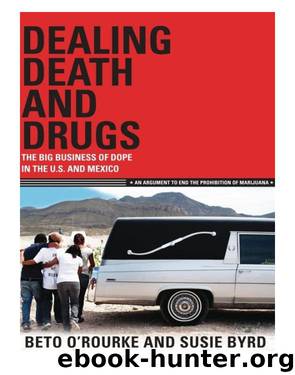Dealing Death and Drugs by Beto O'Rourke

Author:Beto O'Rourke
Language: eng
Format: epub
Publisher: Cinco Puntos Press
Published: 2011-11-14T16:00:00+00:00
In a time of increasing debate over almost every penny spent by the feds—a debate that almost shut down the government in 2011—it seems strange that law enforcement programs, unlike treatment and prevention programs, are almost never held up to scrutiny. Public officials demand accountability and constant assessments of prevention and treatment programs. They want to know that investment in those strategies will pay off. Do they work? As a result, there are exhaustive studies looking at whether prevention programs keep kids from lighting up that first joint and whether treatment programs help drug addicts come clean and stay clean.
It is rare for public officials to demand that same accountability from law enforcement efforts to “conquer drug abuse.” As a result, there are few studies examining what the impact of law enforcement efforts have been on American’s access to and use of illegal drugs. When elected officials do raise concerns about the success of law enforcement efforts, they are usually headed off at the pass with moral absolutes like, “We have to keep drugs out of the hands of children,” that assume that we are doing just that with current drug policy.
While there are few studies on the effectiveness of the drug war, we do have information about where we were when we started and where we are now.
Law enforcement efforts to disrupt illegal drug markets are focused along the whole supply chain, from farm to market. Law enforcement strategies include eradicating poppies, opium and marijuana, closing down production labs, seizing product on its way to market with increasing efforts and resources focused on ports of entry and routes leaving border cities, arresting people who participate in the drug trade (traffickers, dealers, buyers) and seizing money and assets amassed by these same people.
The hope behind supply-side law enforcement efforts (eradication and seizures) is that if law enforcement seizes enough product, it will limit supplies of that product in American markets. Limited supplies will then force drug dealers to increase their price or decrease the purity or do both to continue to feed the demand with a more limited supply. The thought behind the strategy is that a higher price and a less powerful high will reduce the customer base and curb enthusiasm for new participants to enter the marketplace.
In his comments at the 2010 Border Security Conference, U.S. Drug Czar Gil Kerlikowske highlighted the theory behind law enforcement strategies aimed at limiting supplies of illegal drugs in American markets by making these remarks about the possibility of legalizing marijuana: “One more reason why the U.S. is absolutely opposed to the legalization of any drug: legalizing drugs makes them cheaper, makes them more accessible, and therefore makes them more widely abused.” Based on this logic about legalization, we should then assume that prohibition and 40 years of the drug war eradication and seizures has made illegal drugs more expensive, less accessible and less widely abused.
The reality is just the opposite. Cocaine’s market history most obviously undermines the theories perpetuated by U.S. policymakers who support prohibition.
Download
This site does not store any files on its server. We only index and link to content provided by other sites. Please contact the content providers to delete copyright contents if any and email us, we'll remove relevant links or contents immediately.
The Secret History by Donna Tartt(16611)
The Social Justice Warrior Handbook by Lisa De Pasquale(11486)
Thirteen Reasons Why by Jay Asher(7783)
This Is How You Lose Her by Junot Diaz(5755)
Weapons of Math Destruction by Cathy O'Neil(5032)
Zero to One by Peter Thiel(4818)
The Myth of the Strong Leader by Archie Brown(4787)
Promise Me, Dad by Joe Biden(4441)
Stone's Rules by Roger Stone(4413)
Beartown by Fredrik Backman(4406)
How Democracies Die by Steven Levitsky & Daniel Ziblatt(4393)
The Fire Next Time by James Baldwin(4338)
100 Deadly Skills by Clint Emerson(4072)
A Higher Loyalty: Truth, Lies, and Leadership by James Comey(4028)
Rise and Kill First by Ronen Bergman(4009)
The David Icke Guide to the Global Conspiracy (and how to end it) by David Icke(3876)
The Farm by Tom Rob Smith(3870)
Secrecy World by Jake Bernstein(3774)
The Doomsday Machine by Daniel Ellsberg(3726)
